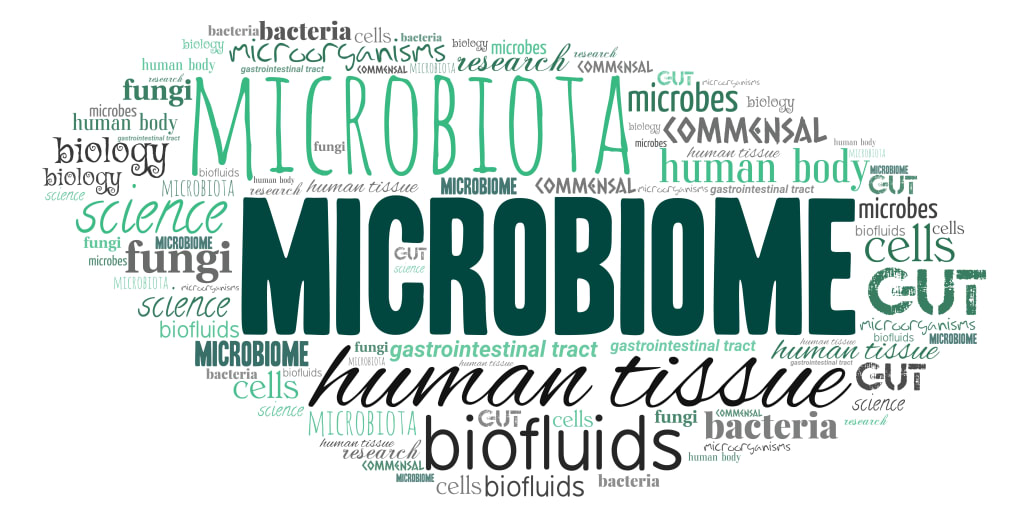Strategies to grow and improve your microbiome
Ways to a better microbiome

Our body has around 40 trillion bacteria, the most of which dwell in your gut. They are part of the gut microbiome, which is important for overall health.
Unfortunately, some germs can cause a range of gastrointestinal diseases. Many factors, including the foods you eat, might alter the type of bacteria in your digestive tract.
Here are some tips to help you enhance and expand your gut microbiome:
Eat a variety of foods.
Numerous hundred types of bacteria dwell in your gut, each with a distinct job and distinctive nutritional requirements. Healthy microbiomes are varied in general.
The more bacteria species you have, the more significant the health benefits they may bring. Microbiomes can become more diversified as a result of a varied diet.
Consume plenty of beans, fruits, legumes, and veggies.
Fruits and vegetables are the finest sources of nutrients for keeping a healthy microbiome. Their fiber-rich content, on the other hand, makes digestion problematic. Fiber is the indigestible part of plant-based foods that our gut bacteria consume. Some bacteria in your stomach can digest fiber, permitting them to flourish. There are different types of fibers, such as soluble and insoluble fibers, which can have different effects on gut bacteria. Consuming a diet high in fiber can promote the growth of beneficial bacteria and can help improve gut health.
Beans and legumes are also high in fiber. You can boost your gut flora by consuming high-fiber meals like apples, artichokes, bananas, beans, broccoli, chickpeas, raspberries, and complete grains
Consuming vegetables and fruits has been found in studies to inhibit the growth of particular disease-causing bacteria. Apples, artichokes, blueberries, almonds, and pistachios have also been shown to enhance bifidobacteria in people. Beneficial bacteria, such as bifidobacteria, have been shown to reduce intestinal inflammation and promote gut health.
Consume fermented foods on a regular basis.
Fermented foods are foods that have been through a process of lacto-fermentation in which natural bacteria feed on sugars and starch in the food creating lactic acid, this process preserves the food and creates beneficial enzymes, b-vitamins, Omega-3 fatty acids, and various strains of probiotics.
Several examples of these are kefir, kimchi, kombucha, sauerkraut, and yoghurt.
Lactobacilli are helpful bacteria that may be found in many of these foods. Furthermore, persons who consume yogurt on a regular basis have higher levels of intestinal lactobacilli.
Yogurt also improves the performance and makeup of the microbiome. However, keep in mind that most yogurts, especially those with added flavors, are heavy in sugar. As a result, basic, unsweetened yogurt or flavored variants produced solely from milk and bacterium mixes are preferable.
Make sure the label reads "contains live active cultures" for gut health advantages. Additionally, fermented soybean milk can boost the quantity of good bacteria, such as bifidobacteria and lactobacilli, while decreasing the number of dangerous bacteria. Kimchi may also be beneficial to intestinal bacteria.
Consume whole grains.
Beta-glucan is a kind of nondigestible carbohydrate present in whole grains. Instead of being absorbed in the small intestine, these carbohydrates boost the development of good bacteria in the large intestine.
Humans have been observed to develop Bifidobacteria, Lactobacilli, and Bacteroidetes after consuming whole grains. In these trials, whole grains lowered inflammation and some risk factors for heart disease in addition to enhancing sensations of fullness.
However, gluten-containing cereals such as wheat, barley, and rye may have a deleterious impact on gut health due to increased intestinal permeability and inflammation. More study is needed to evaluate if consuming gluten-containing cereals alters gut microbiomes in healthy persons who do not have celiac disease or gluten sensitivity.
Plant-based diets are beneficial.
Animal-based diets promote the development of different gut flora than plant-based diets. Vegetarian diets may boost the gut microbiota due to their high fiber content.
One previous study published in 2013 discovered that vegetarian diets lowered levels of disease-causing bacteria, inflammation, and cholesterol in obese persons. While particular nutrients in plant meals may benefit gut health by increasing good bacteria populations and lowering dangerous strains, according to a 2019 review. Although other variables may be involved, it is uncertain if vegetarian diets provide health benefits for the gut microbiota due to a lack of meat intake.
Consume foods high in polyphenols.
Polyphenols have several health advantages, including lower blood pressure, inflammation, cholesterol levels, and oxidative stress. It should be noted that polyphenols are not always digestible by human cells.
Polyphenols are most likely transported to the colon, where they are broken down by gut flora. Polyphenols can be found in foods like almonds, blueberries, dark chocolate, cocoa broccoli, the skins of grapes, onions, green tea, and red wine.
Consume probiotics supplements.
Probiotics, in general, are living microorganisms that provide a significant health benefit when taken. Probiotics do not always colonize the intestines permanently.
They may, however, promote your health by changing the makeup of your microbiota and increasing your metabolism. They can help replenish beneficial bacteria in the gut, particularly after a course of antibiotics. According to an analysis of seven trials, probiotics have no effect on the gut microbiomes of healthy persons.
Probiotics supplements come in different forms such as capsules, powders, and even food and drinks, and they can be used to target specific health conditions.
Reducing Stress.
Chronic stress can have a negative impact on gut health by altering the balance of bacteria in the gut. This can happen through several pathways, such as changes in gut motility, immune system, and even gut permeability. Practicing stress-reducing activities such as meditation, yoga or exercise, can help promote healthy gut bacteria.
Your bacteria believe that if they are working hard to keep you healthy, you should too! Physically active people's microbiomes are more nutritious and diversified.
Working exercise is one of the finest ways to unwind after a busy day. Even walking for 30 minutes a day can improve your gut health and assist these little microorganisms to regulate your stress and mental wellness.
Your gut microbes influence several areas of your health. Many studies have connected a disturbed microbiome to a variety of chronic illnesses.
Conclusion.
In conclusion, the microbiome is an important aspect of overall health, and adopting the abovementioned strategies can be used to improve and grow the microbiome. It is important to remember that everyone's gut microbiome is unique, and it is always best to consult with a healthcare professional before making any major changes to your diet or supplement regimen. However, by implementing a combination of these strategies, it is possible to promote a healthy and diverse gut microbiome, which can lead to improved overall health.
About the Creator
Willie Wun
I am a senior who is very keen on health and longevity issues and would like to share such knowledge with whoever is interested in these areas. Please SUBSCRIBE if you find the information useful and I can be motivated to share them daily






Comments
There are no comments for this story
Be the first to respond and start the conversation.